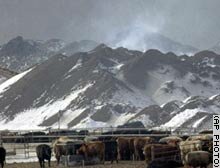 I wanted to follow up with our discussion about Food, Ethics, and the Environment (part 1). Eric Schlosser stated his viewpoints on how McDonalds has led the way to a beef industrial complex which has had negative effects on our health and our environment. One of our questions was, was this ethical? What are the effects on our environment and our health? Any concern for animal welfare? What about the ethical responsibility of other corporations?
I wanted to follow up with our discussion about Food, Ethics, and the Environment (part 1). Eric Schlosser stated his viewpoints on how McDonalds has led the way to a beef industrial complex which has had negative effects on our health and our environment. One of our questions was, was this ethical? What are the effects on our environment and our health? Any concern for animal welfare? What about the ethical responsibility of other corporations?Well, one thing's for certain, McDonald's is caving in from consumer pressure to be better and more responsible when it comes to these issues. Especially in the last 3 years. McDonald's has officially banned some antibiotics and growth hormones in the beef it buys. But in what ways and how much is actually changing? Here's a few articles about how McDonald's is changing their tune with antibiotics in chicken and cattle, and the environment in general. Are they big enough to change the system they helped put in place? Only time (and continued consumer pressure) will tell.
- "McDonald's says no more playing chicken with antibiotics" -Environmental Defense
- Discussing "McLibel: Two Worlds Collide " -Elisa Freeling
- Rainforest McFriendly coffee? -Environmental News Network
- McDonald's New Worldwide Corporate Responsibility Report Now Available
- McDonalds Recognized for Social & Environmental Efforts by Ceres -Treehugger













